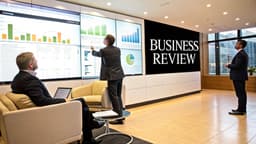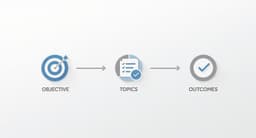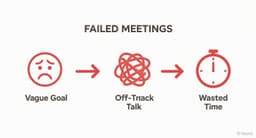Planning a successful event is like building a house: without a solid blueprint, you risk chaos, confusion, and costly mistakes. Your event agenda is that blueprint. It’s the critical document that dictates the flow, sets expectations, and ensures every moment serves a purpose. A poorly structured agenda leads to disengaged attendees, missed objectives, and a timeline that quickly spirals out of control. A great one, however, creates a seamless and memorable experience for everyone involved.
This guide moves beyond generic outlines. We’re providing a curated list of versatile sample event agenda template examples designed for specific goals, from high-stakes business conferences to interactive workshops and elegant fundraising galas. For each template, we’ll break down the strategic thinking behind its structure, offering actionable insights and customization tips. You’ll learn not just what to include, but why it works, empowering you to build an agenda that guarantees your event runs smoothly and achieves its goals.
1. The Business Conference Agenda Template: Maximizing Professional Engagement
A business conference agenda is the blueprint for a successful corporate event. This structured format is designed to balance high-level learning with valuable networking, making it ideal for multi-day events with diverse audiences. It skillfully blends keynote presentations, specialized breakout sessions, panel discussions, and designated networking breaks to keep attendees engaged and informed.
This type of sample event agenda template is most effective for events spanning one to three days, accommodating a wide range of attendees. The structure allows for multiple parallel tracks, enabling participants to customize their experience by choosing sessions most relevant to their professional interests.
Strategic Breakdown
The core strategy behind this template is structured flexibility. The main stage keeps everyone aligned with a central theme through keynotes, while breakout sessions cater to niche interests. This approach ensures every attendee finds significant value, preventing disengagement.
- Morning Sessions: Typically dedicated to high-impact keynote speakers to energize the audience and set the tone for the day.
- Mid-day Breakouts: Allow for deeper dives into specific topics. This is where attendees can gain specialized knowledge and interact with experts in smaller groups.
- Afternoon Networking: Strategically placed networking lunches or coffee breaks prevent fatigue and foster connections, which are often as valuable as the formal content.
Actionable Takeaways
To implement this template effectively, focus on balance. Avoid packing the schedule too tightly; buffer time between sessions is crucial for travel between rooms and informal conversations. Use a clear coding system (e.g., color-coding or track labels) in the agenda to help attendees easily navigate their options.
This infographic summarizes the key parameters for using a business conference agenda template.
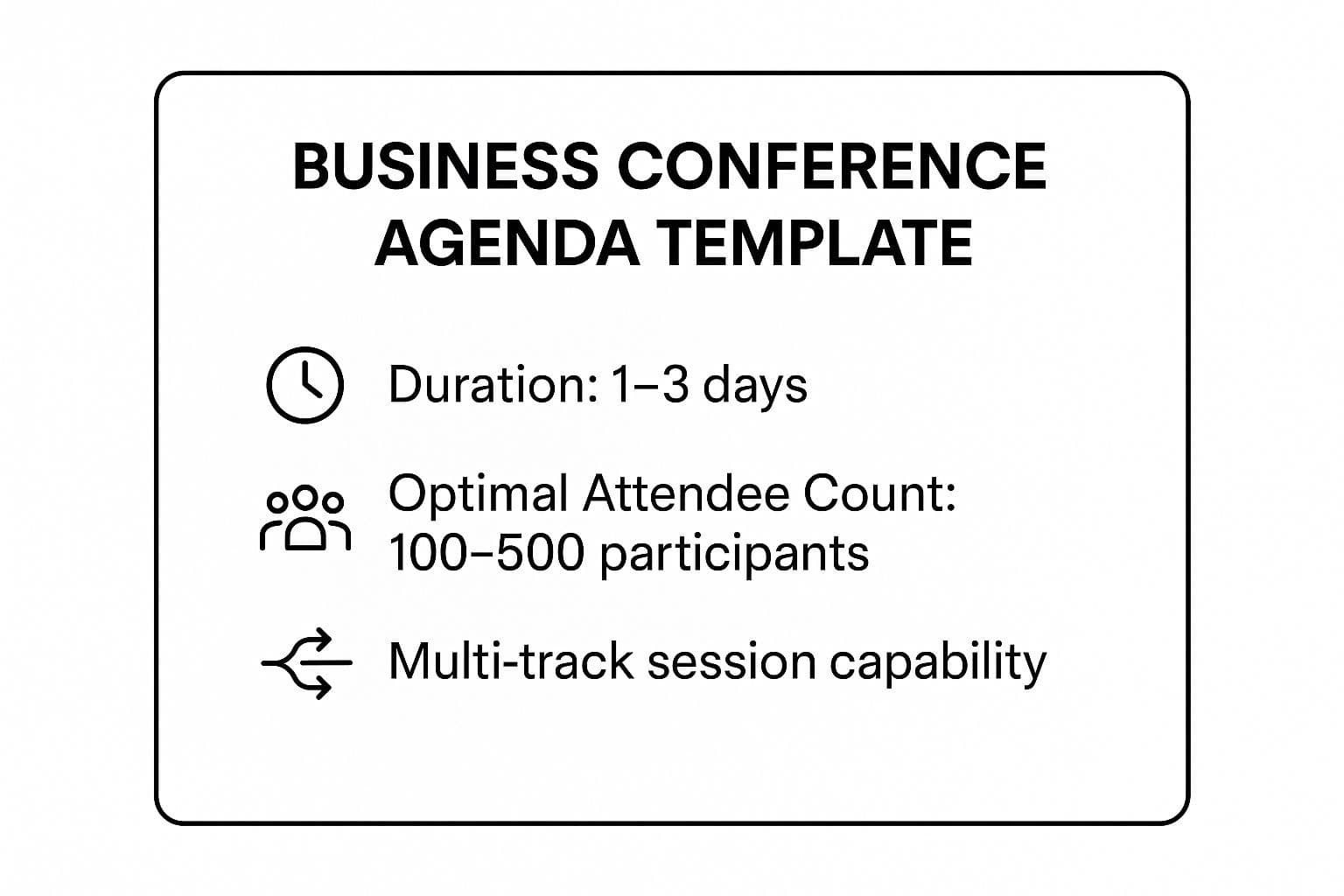
As the data shows, this template is built for scale, supporting multi-day, multi-track events for a substantial number of participants. This structure is essential for maximizing both learning and networking ROI for everyone involved.
2. The Workshop Training Agenda Template: Fostering Active Learning
A workshop training agenda is an interactive blueprint designed for skill acquisition and hands-on learning. This format prioritizes participant engagement through a dynamic mix of expert-led instruction, collaborative activities, group work, and immediate application of new concepts. It transforms passive listening into active participation, making it ideal for corporate training, skill bootcamps, and professional development sessions.
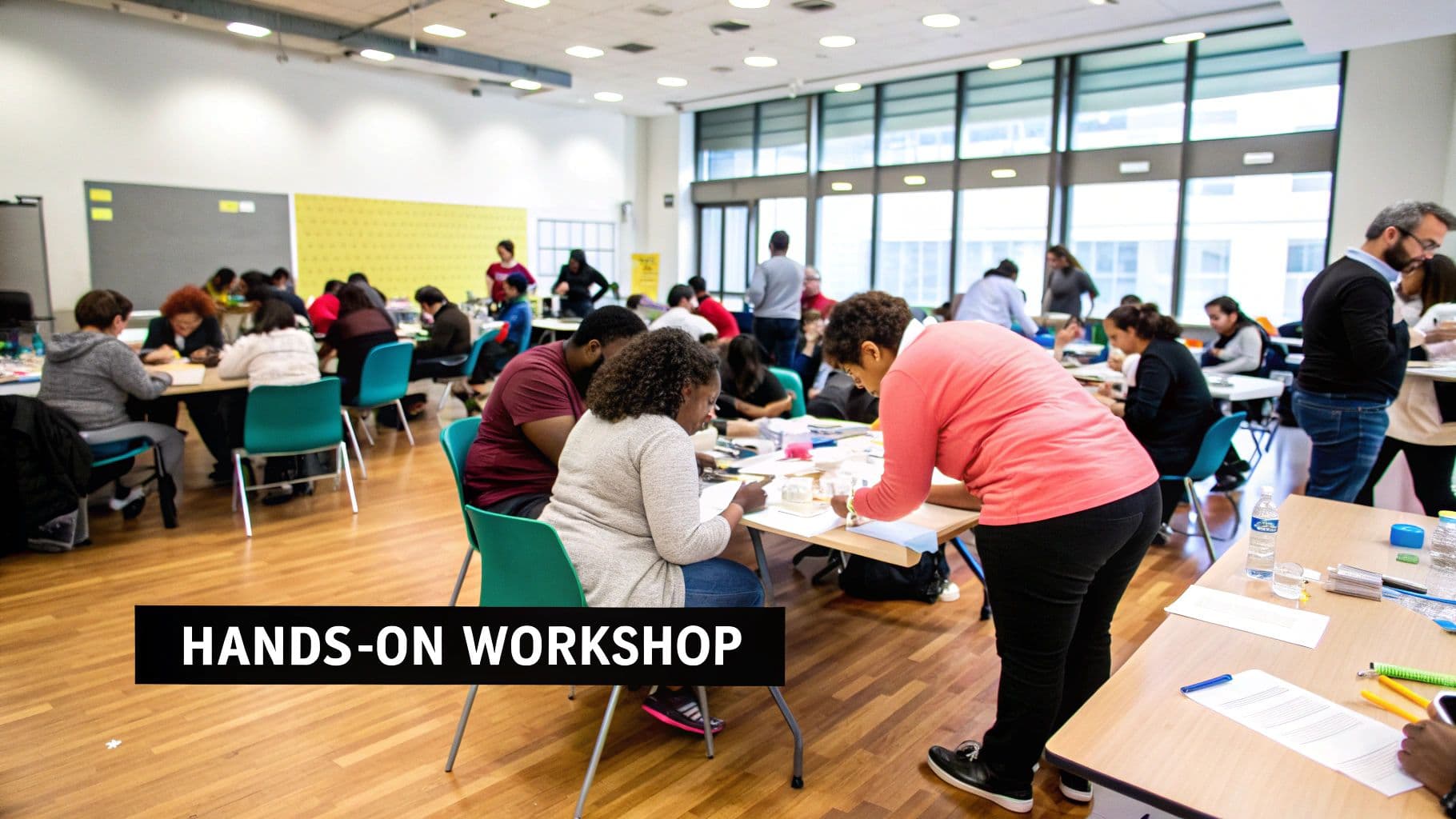
This sample event agenda template is most effective for small to medium-sized groups in half-day or full-day formats. Its structure, popularized by organizations like IDEO and Dale Carnegie, focuses on a cycle of learning, doing, and receiving feedback, ensuring concepts are not just understood but retained. Efficiently documenting these sessions is key; explore how to take better meeting notes to capture crucial takeaways.
Strategic Breakdown
The core strategy behind this template is guided application. It moves beyond theory by building a structured environment where attendees can safely practice and internalize new skills. Each segment is intentionally designed to build upon the last, creating a logical progression from concept to competency.
- Introduction & Theory: The workshop begins with a concise presentation of core concepts and goals to provide a foundational understanding.
- Guided Practice: Facilitators lead hands-on activities, group discussions, or problem-solving exercises where participants apply the theory in a controlled setting.
- Feedback & Reflection: This crucial phase includes peer feedback, facilitator guidance, and group reflection to reinforce learning, address challenges, and solidify understanding.
Actionable Takeaways
To implement this template effectively, focus on momentum and interaction. Limit breakout groups to 6-8 participants to ensure everyone can contribute. Plan short, energizing activities every couple of hours to maintain focus and combat fatigue. Prepare both physical handouts and digital resources to accommodate different learning styles and provide lasting value.
3. The Product Launch Event Agenda Template: Building Market Buzz
A product launch event agenda is a meticulously crafted sequence designed to generate maximum excitement, media coverage, and customer interest for a new offering. This marketing-focused format combines a powerful narrative, live demonstrations, and exclusive access to create an unforgettable experience. It’s the engine behind legendary launches like Apple’s iPhone reveals and Tesla’s vehicle unveilings.
This type of sample event agenda template is perfectly suited for a single, high-impact event, typically lasting one to three hours. It targets a diverse audience including press, industry influencers, key partners, and loyal customers. The goal is not just to inform but to create a spectacle that drives immediate conversation and market momentum.
Strategic Breakdown
The core strategy is controlled revelation and emotional engagement. The agenda builds suspense, unveils the product as the hero of a story, and provides tangible proof of its value through flawless demonstrations. The entire event is engineered to be shareable, encouraging social media buzz.
- The Build-Up: The event opens with a compelling narrative, often delivered by a key executive, that sets the stage by defining a problem or an opportunity.
- The Reveal: The product is unveiled in a dramatic moment, followed by a detailed, benefit-oriented presentation of its key features and innovations.
- The Experience: A live, flawlessly executed demonstration shows the product in action. This is often followed by hands-on opportunities for attendees, creating authentic, shareable moments.
Actionable Takeaways
To execute this template successfully, focus on storytelling and perfection in delivery. Technical glitches can derail the entire event, so extensive rehearsals are non-negotiable. Ensure you create dedicated zones or moments for hands-on interaction and photo opportunities. Prepare tailored messaging for different audience segments like media, partners, and customers.
As seen in iconic launches, this template transforms a simple announcement into a major cultural event. It focuses on creating a powerful first impression that defines the product's market trajectory from day one.
4. The Academic Symposium Agenda Template: Fostering Intellectual Exchange
An academic symposium agenda is a highly structured framework designed to facilitate the presentation and discussion of scholarly research. This format is the cornerstone of events hosted by universities, research institutions, and academic associations like the IEEE or the American Psychological Association. It prioritizes intellectual discourse through a carefully sequenced series of paper presentations, poster sessions, and moderated panel discussions.
This specific sample event agenda template is ideal for events where the primary goal is knowledge dissemination and peer review. It serves a specialized audience of researchers, academics, and students who gather to share findings, debate theories, and advance their respective fields. The agenda is built to manage a high volume of content while allowing for in-depth exploration of specific topics.
Strategic Breakdown
The core strategy of this template is structured depth. It organizes a vast amount of specialized information into coherent, thematic tracks to ensure attendees can easily find and engage with research relevant to their work. The format balances formal presentations with interactive sessions to foster both learning and collaboration.
- Morning Sessions: Often begin with a keynote from a distinguished scholar to establish a central theme, followed by several concurrent paper presentation sessions organized by sub-discipline.
- Mid-day Posters: Poster sessions are strategically placed, often during lunch or coffee breaks, to encourage informal, one-on-one discussions between presenters and attendees in a less formal setting.
- Afternoon Panels: Concluding the day with panel discussions or roundtables allows for broader conversations on overarching themes, synthesizing the research presented and identifying future research directions.
Actionable Takeaways
To execute this template successfully, strict time management is paramount. Enforce presentation time limits rigorously to keep concurrent sessions on schedule. Provide presenters with clear guidelines for abstracts, papers, and poster dimensions well in advance. Furthermore, build dedicated networking time around poster sessions to maximize interaction, as these informal conversations are often where new collaborations are born.
5. The Nonprofit Fundraising Gala Agenda Template: Inspiring Generosity
A nonprofit fundraising gala agenda is meticulously crafted to create an emotional connection between attendees and the organization's mission, ultimately inspiring donations. This template structures an elegant evening event that balances entertainment, mission-focused storytelling, and clear calls to action. It is designed to host VIPs, donors, and community leaders for a memorable experience that drives financial support.
This type of sample event agenda template is ideal for evening events lasting three to four hours. It creates a sophisticated atmosphere where guests feel valued and are receptive to the organization's message, making it perfect for major donor cultivation and annual fundraising campaigns.
Strategic Breakdown
The core strategy behind this template is emotional progression. The evening starts with networking and entertainment to build rapport, transitions to compelling mission-focused content to create an emotional anchor, and culminates in a structured fundraising appeal when guests are most engaged.
- Opening Reception: A cocktail hour allows guests to mingle, builds a sense of community, and sets a positive tone before the formal program begins.
- Mission-Focused Program: This segment is the heart of the event. It combines brief speeches, impactful videos, and powerful beneficiary testimonials to connect attendees directly to the cause.
- The "Ask": Following the emotional peak, a live auction, paddle raise, or direct appeal is made. This is strategically timed to capitalize on the inspiration and goodwill generated by the program.
Actionable Takeaways
To execute this template successfully, keep the mission presentation concise and powerful, ideally under 15 minutes. Integrate mobile bidding technology for silent and live auctions to increase engagement and make donating easier. Feature compelling stories rather than dry statistics, as personal testimonials are far more effective at inspiring generosity. Finally, ensure every element, from decor to closing remarks, reinforces the organization's mission and gratitude.
6. The Virtual/Hybrid Event Agenda Template: Engaging Distributed Audiences
A virtual or hybrid event agenda is a meticulously planned schedule designed for the unique challenges of online and blended audiences. This format prioritizes digital engagement, accounting for different time zones, screen fatigue, and the need for seamless technology integration. It blends shorter content segments, interactive tools, and dedicated virtual networking to create a cohesive experience for both in-person and remote attendees.
This type of sample event agenda template is essential for any modern event, from global conferences like Microsoft Ignite to targeted virtual trainings. It acknowledges that online attention spans are shorter and requires a dynamic structure to maintain participant focus and involvement across different locations.
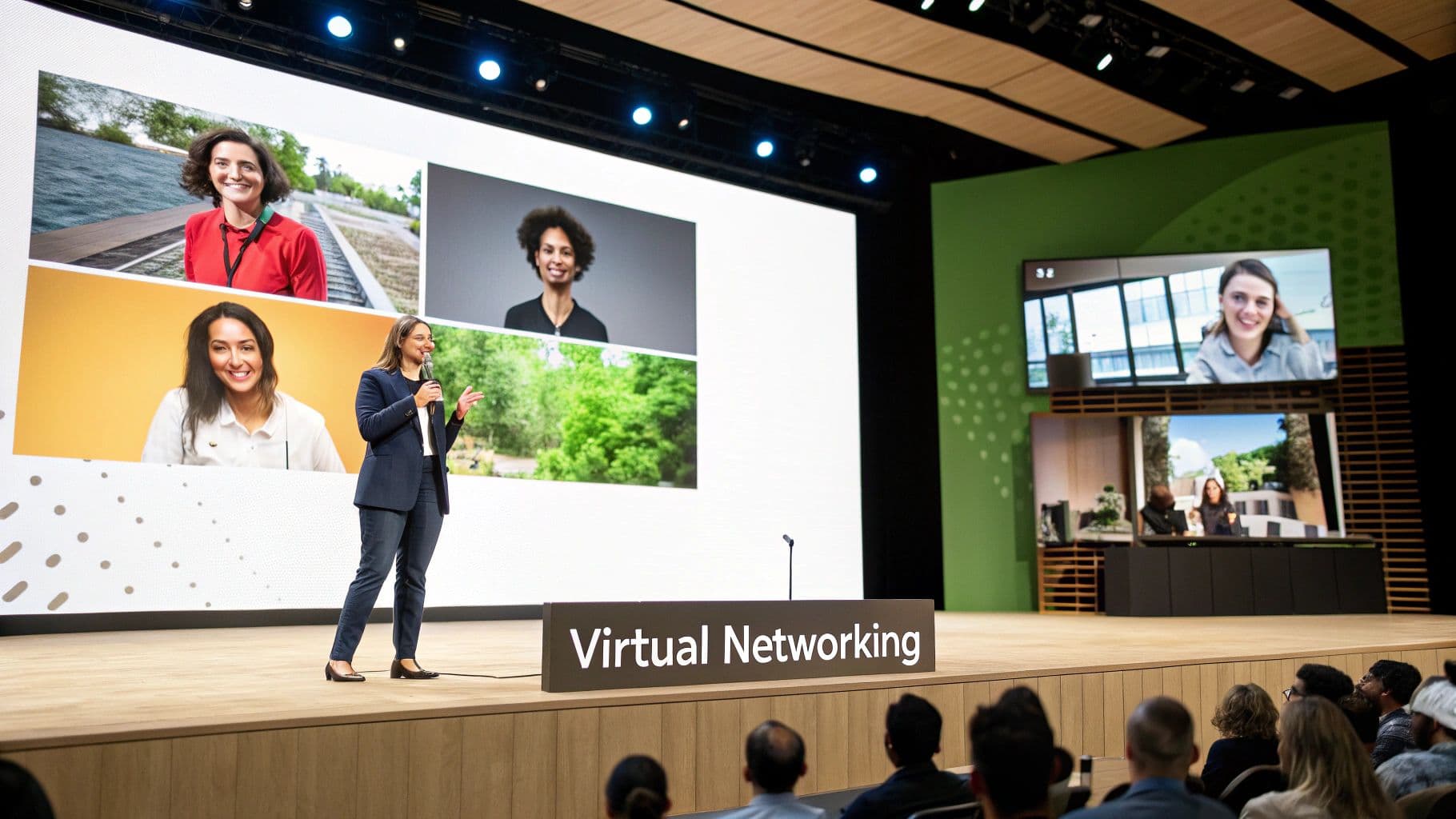
Strategic Breakdown
The core strategy is purposeful digital interaction. Unlike an in-person event where engagement can be passive, a virtual agenda must actively prompt participation. The goal is to make remote attendees feel just as involved as those on-site by using technology to bridge the physical gap. For tools to help manage post-event content, check out these features for creating efficient meeting summaries.
- Concise Content Blocks: Sessions are kept short, typically 45 minutes or less, to combat screen fatigue and maintain high energy levels.
- Frequent Engagement Prompts: Interactive elements like live polls, Q&A sessions, and chat discussions are scheduled every 10-15 minutes to keep the audience actively involved.
- Flexible Access: Content is often made available on-demand after the live session, accommodating attendees in different time zones and those who want to revisit key information.
Actionable Takeaways
To effectively implement this template, prioritize technology and timing. Conduct thorough pre-event tech checks with all speakers and provide clear instructions for attendees. Structure the agenda with generous breaks and consider scheduling keynotes at times that are reasonably accessible for your primary audience regions. Use dedicated virtual networking tools like breakout rooms or specialized platforms to facilitate meaningful connections that might otherwise be missed.
Sample Event Agenda Templates Comparison
| Agenda Template | 🔄 Implementation Complexity | ⚡ Resource Requirements | 📊 Expected Outcomes | 💡 Ideal Use Cases | ⭐ Key Advantages |
|---|---|---|---|---|---|
| Business Conference Agenda | High coordination; multi-track planning | Significant staffing, venue, technology | Professional, scalable learning & networking | Corporate events with 100-500 professionals | Credible format; clear time management |
| Workshop Training Agenda | Extensive preparation; facilitator intensive | Specialized materials; smaller groups | High engagement; strong skill retention | Skill development; small groups (12-30) | Practical learning; customizable delivery |
| Product Launch Event Agenda | Complex logistics; high-pressure environment | High resource & tech investment | Strong brand visibility; media coverage | Marketing-rich product launches (100-1000+) | High impact marketing; immediate feedback |
| Academic Symposium Agenda | Moderate to high complexity; strict scheduling | Specialized knowledge and scholarly resources | Knowledge sharing; academic collaboration | Research, education, and scholarly discourse | Professional development; networking |
| Nonprofit Fundraising Gala Agenda | High event complexity; volunteer coordination | High upfront costs; formal setting | Fundraising success; donor engagement | Formal fundraising (100-500 attendees) | Emotional connection; media exposure |
| Virtual/Hybrid Event Agenda | High technology dependency; multi-time zone | Robust digital platforms & support | Global reach; cost-effective participation | Distributed/remote audiences, large scale | Accessibility; recorded content; data insights |
From Template to Triumph: Your Next Steps
We’ve explored a diverse range of event agenda templates, from the structured flow of a business conference to the engaging cadence of a hybrid workshop. Each example, whether for a product launch or a fundraising gala, shares a core principle: a great agenda is more than a schedule. It's a strategic blueprint designed to guide attendee experience, maximize engagement, and achieve specific, measurable goals.
The key takeaway is that the most effective agendas are built on a foundation of purpose and flexibility. They balance structured content delivery with essential breaks for networking, reflection, and rejuvenation. By analyzing each sample event agenda template, you can see how timing, session variety, and audience interaction are strategically woven together to create a cohesive and memorable experience. Remember, the details matter immensely, from clear session descriptions to well-timed transitions between speakers.
Your next step is to move from inspiration to implementation. Don't just copy a template; adapt it. Use the frameworks we've discussed as your starting point and begin customizing one to fit your unique event objectives, audience needs, and logistical constraints.
Actionable Next Steps:
- Define Your Core Objective: Before selecting a template, clearly state what you want your event to achieve. Is it lead generation, team training, or community building?
- Map the Attendee Journey: Use your chosen template to outline the ideal experience from the moment an attendee arrives until they leave. Consider the energy levels and focus required for each session.
- Gather Feedback and Iterate: Share a draft of your agenda with key stakeholders or a small test group. Use their feedback to refine timings, session topics, and interactive elements.
Ultimately, mastering the art of the agenda transforms your events from simple gatherings into powerful, purpose-driven experiences. A well-crafted agenda respects your attendees' time, keeps your team aligned, and ensures your event's core message resonates long after the final session ends. It's the critical tool that turns logistical planning into strategic success.
After your event concludes, ensure every valuable insight and action item is captured and shared. Summarize Meeting uses AI to transcribe, analyze, and generate concise summaries from your event recordings, making post-event follow-up effortless. Transform your event content into actionable intelligence by visiting Summarize Meeting.
